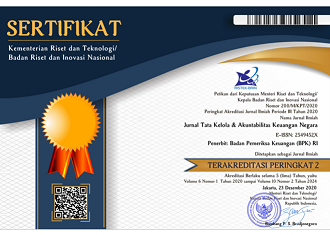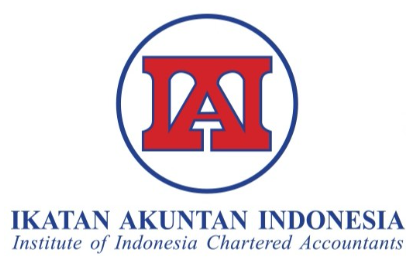ARE LOCAL GOVERNMENTS OVERCONFIDENT WITH THE EFFECT OF BUDGET FORECAST ERRORS ON BUDGET DEVIATION?
DOI:
https://doi.org/10.28986/jtaken.v6i2.480Keywords:
Budget forecast errors, local government overconfidence, budget deviationAbstract
This study aims to examine the effect of budget forecast errors on budget deviations moderated by local governments’ overconfidence. The research sample used regency/city governments in Indonesia during the 2017-2019 period. The analysis tool uses Eviews version 10 and SPSS version 22. The results showed that budget forecast errors had a positive and significant effect on budget deviation, but the local government’s overconfidence cannot cause an effect of budget forecast errors on the budget deviation. Additional test results of this study also showed that regency/city governments who were overconfident tend to fail in controlling their budget which could cause a surplus or deficit compared to local governments that were not overconfident. The same conditions apply to budget forecast errors. This means that regency/city governments that are overconfident tend to estimate budgets that are too high for revenue and/or budget estimates that are too low for expenditure compared to local governments that are not overconfident. Consistent with the main test results, this study shows that budget forecast errors have a significant effect on budget deviation and tend to occur in the Central Indonesian region category. Furthermore, overconfident regency/city governments cannot moderate the effect of budget forecast errors on budget deviations. Finally, these findings indicate that there is no difference between the budget forecast errors and the budget deviation in the three categories of western, central, and eastern Indonesia.
References
Auerbach, A. J. (1999). On the performance and use of government revenue forecast. National Tax Journal, 52(4), 767-782.
Boukari, M., & Veiga, F. J. (2018). Disentangling political and institutional determinants of budget forecast errors: A comparative approach. Journal of Comparative Economics, 46(4), 1030-1045. DOI: 10.1016/j.jce.2018.03.002
Dubois, E. (2016). Political business cycle 40 years after Nordhaus. Public Choice, 166(1), 235-259.
Dwiharja, L. M., & Kurrohman, T. (2013). Pengaruh akuntabilitas dan transparansi pengelolaan Anggaran Pendapatan dan Belanja Sekolah (APBS) terhadap partisipasi Komite Sekolah. Jurnal Riset Akuntansi dan Keuangan, 1(3), 182-194. DOI: 10.17509/jrak.v1i3.6696
Ghozali, I., & Ratmono, D. (2017). Analisis multivariate dan ekonometrika: Teori, konsep, dan aplikasi dengan Eviews 10. Semarang: Badan Penerbit Universitas Diponegoro.
Gujarati, D., & Porter, D. C. (2009). Basic econometrics (5th Ed.). New York: McGraw-Hill.
Hansen, D. R., & Mowen, M. M. (2009). Akuntansi manajerial (Edisi 8). Jakarta: Salemba Empat.
Herianti, E. (2019). Budget turbulence and budget deviation: Do local governments have the ability to reduce them?. Jurnal Tata Kelola dan Akuntabilitas Keuangan Negara, 5(1), 1-20. DOI: 10.28986/jtaken.v5i1.285
Huang, W., Jiang, F., Liu, Z., & Zhang, M. (2011). Agency cost, top executives’ overconfidence, and investment-cash flow sensitivity: Evidence from listed China. Pacific-Basin Finance Journal, 19(3), 261-277.
Jensen, M. C., & Meckling, W. H. (1976). Theory of the firm: Managerial behavior, agency cost, and ownership structure. In: Brunner K. (eds) Economics Social Institutions. Rochester Studies in Economics and Policy Issues, 1, 163-231. DOI: 10.1007/978-94-009-9257-3_8
Johansson, T., & Siverbo, S. (2014). The appropriateness of tight budget control in public sector organizations facing budget turbulence. Management Accounting Research, 26, 271-283. DOI: 10.1016/j.mar.2014.04.001
Jonung, L., Larch, M., Favero, C. A., & Martin, P. (2006). Improving fiscal policy in the EU: The case for the independent forecast. Economics Policy, 21(47), 491-534.
Kartini, K. & Nugraha, N. F. (2015). Pengaruh illusions of control, overconfidence dan emotion terhadap pengambilan keputusan investasi pada investor di Yogyakarta. Jurnal Inovasi dan Kewirausahaan, 4(2), 115-123. DOI: 10.20885/ajie.vol4.iss2.art6
Koo, J., & Yang, D. (2018). Managerial overconfidence, self-attribution bias, and downwardly sticky investment: Evidence from Korea. Emerging Market Finance Trade, 54, 144-161. DOI: 10.1080/1540496X.2017.1398643
Mahsun, M. (2013). Pengukuran Kinerja Sektor Publik. Edisi Pertama. Yogyakarta: BPFE.
Malmendier, U., & Tate, G. (2005). CEO overconfidence and corporate investment. The Journal of Finance, 60(6), 2661-2700. DOI: 10.1111/j.1540-6261.2005.00813.x
Mofsinger, J. R. (2010). The psychology of investing (4th Ed.). New Jersey: Precentice-Hall Inc.
Patty, J. R. (2019). Budget forecast errors and budget deviation: Financial capability index as a moderating variable. Jurnal Tata Kelola dan Akuntabilitas Keuangan Negara, 5(2), 157-175. DOI: 10.28986/jtaken.v5i2.353
Ratmono, D., & Sholihin, M. (2017). Akuntansi keuangan daerah berbasis akrual. Yogyakarta: UPP STIM YKPN.
Rodgers, R., & Joyce, P. (1996). The effect of under forecasting on the accuracy of the revenue forecast by state governments. Public
Administration Review, 56(1), 48-56. DOI: 10.2307/3110053
Surjono, W., & Firdaus, N. R. (2017). Pengaruh sistem akuntansi keuangan daerah terhadap akuntabilitas laporan keuangan pada satuan kerja Dinas Pendapatan dan Pengelolaan Keuangan (DPPK) pemerintah daerah Kabupaten Bandung. Jurnal Riset Akuntansi & Keuangan, 5(1), 1357-1368. DOI: 10.17509/jrak.v5i1.6737
Widarjono, A. (2016). Ekonometrika: Pengantar dan aplikasinya disertai panduan Eviews. Yogyakarta: UPP STIM.
Winarno, W. W. (2015). Analisis ekonometrika dan statistika dengan Eviews. Yogyakarta: UPP STIM.
Wirasedana, I. W. P., Sisdayani, E. A., & Setiawan, I. P. E. (2018). Kendali budget ketat pada pemda di Provinsi Bali dalam menghadapi turbulensi budget. E-Jurnal Akuntansi Universitas Udayana, 25(1), 300-327. DOI: 10.24843/EJA.2018.v25.i01.p12
Yang, D., & Kim, H. (2020). Managerial overconfidence and manipulation of operating cash flow: Evidence from Korea. Finance Research Letters, 32(C), 1-8. DOI: 10.1016/j.frl.2019.101343
Yang, D., & Zhang, Z. (2017). Impact of managerial optimism on cost stickiness: Evidence from China. International Journal of Applied Business and Economic Research, 15(21), 373-383.
Downloads
Submitted
Accepted
Published
How to Cite
Issue
Section
License

Jurnal Tata Kelola dan Akuntabilitas Keuangan Negara is licensed under
a Creative Commons Attribution-ShareAlike 4.0 International License




















